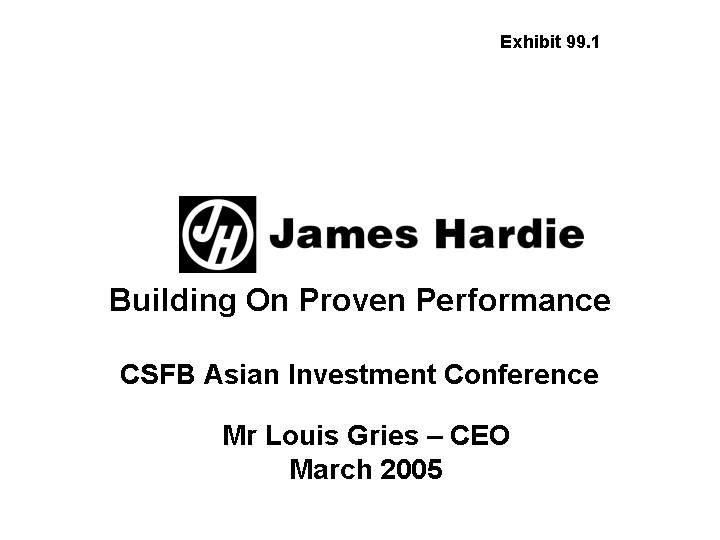
| Building On Proven Performance CSFB Asian Investment Conference Mr Louis Gries - CEO March 2005 |

| Building On Proven Performance CSFB Asian Investment Conference Mr Louis Gries - CEO March 2005 |
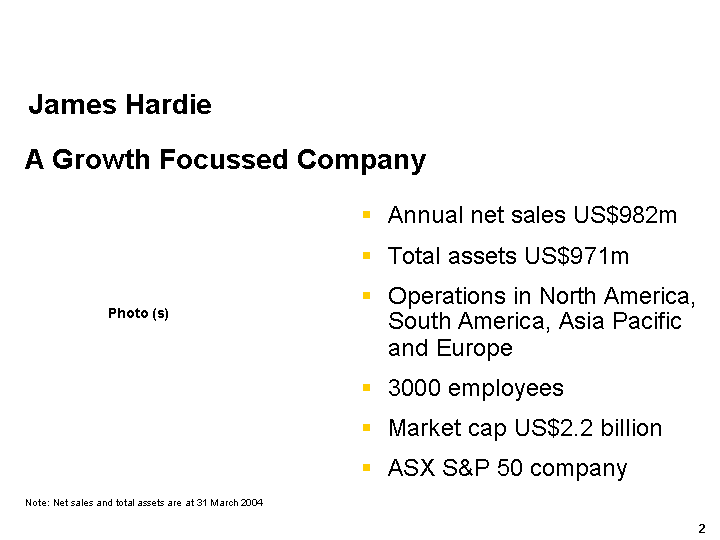
| James Hardie Annual net sales US$982m Total assets US$971m Operations in North America, South America, Asia Pacific and Europe 3000 employees Market cap US$2.2 billion ASX S&P 50 company Note: Net sales and total assets are at 31 March 2004 A Growth Focussed Company Photo (s) |
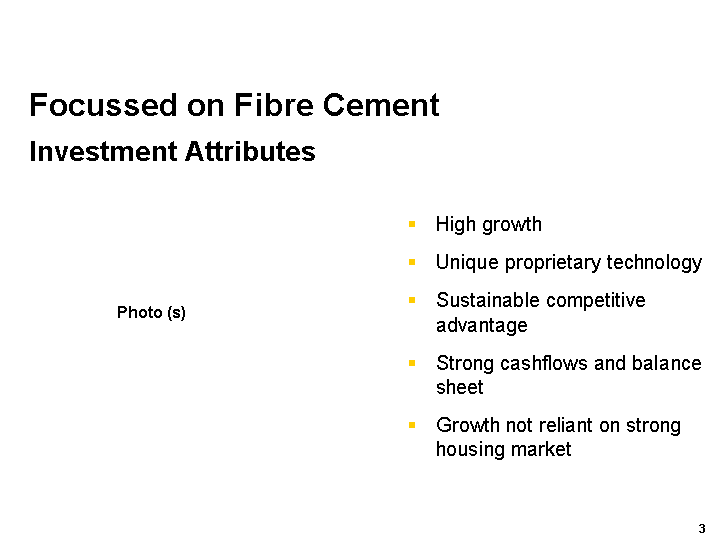
| Focussed on Fibre Cement High growth Unique proprietary technology Sustainable competitive advantage Strong cashflows and balance sheet Growth not reliant on strong housing market Investment Attributes Photo (s) |
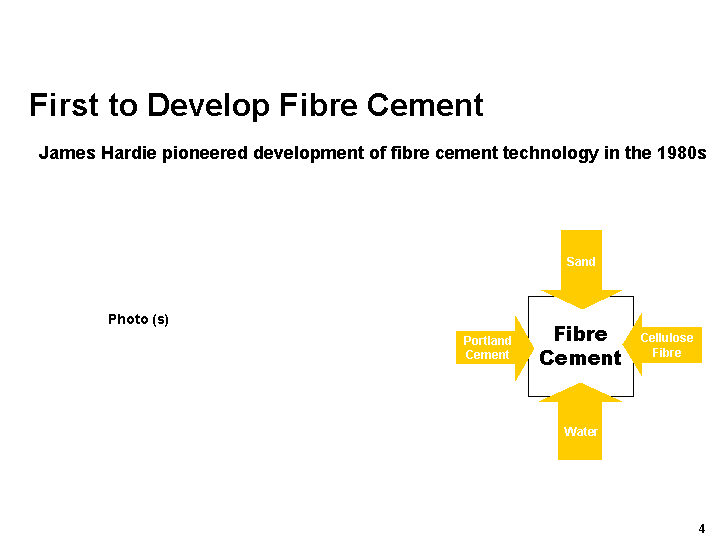
| First to Develop Fibre Cement James Hardie pioneered development of fibre cement technology in the 1980s Fibre Cement Sand Cellulose Fibre Water Portland Cement Photo (s) |
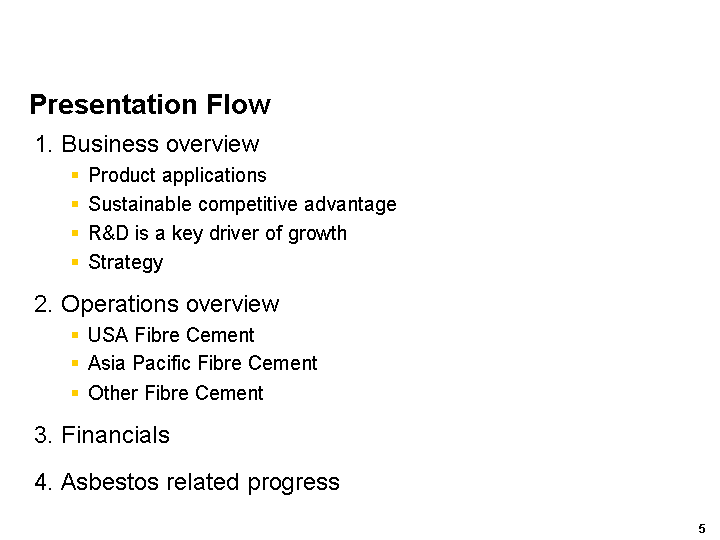
| Presentation Flow 1. Business overview Product applications Sustainable competitive advantage R&D is a key driver of growth Strategy 2. Operations overview USA Fibre Cement Asia Pacific Fibre Cement Other Fibre Cement 3. Financials 4. Asbestos related progress |
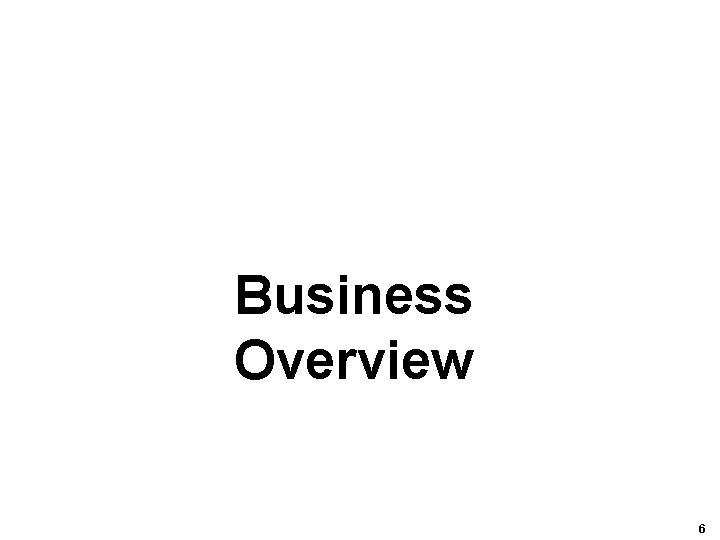
| Business Overview |
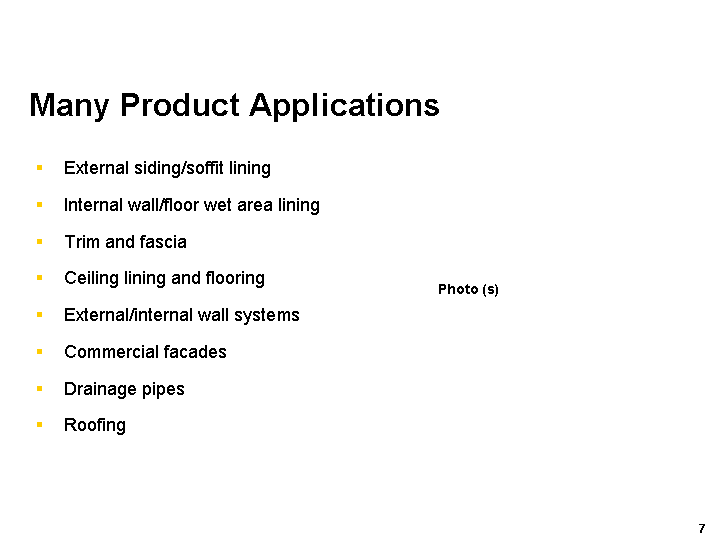
| Many Product Applications External siding/soffit lining Internal wall/floor wet area lining Trim and fascia Ceiling lining and flooring External/internal wall systems Commercial facades Drainage pipes Roofing Photo (s) |
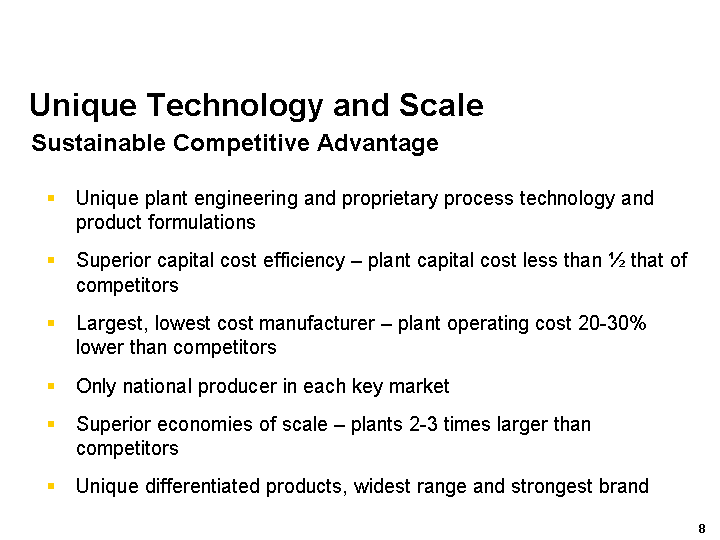
| Unique Technology and Scale Sustainable Competitive Advantage Unique plant engineering and proprietary process technology and product formulations Superior capital cost efficiency - plant capital cost less than 1/2 that of competitors Largest, lowest cost manufacturer - plant operating cost 20-30% lower than competitors Only national producer in each key market Superior economies of scale - plants 2-3 times larger than competitors Unique differentiated products, widest range and strongest brand |
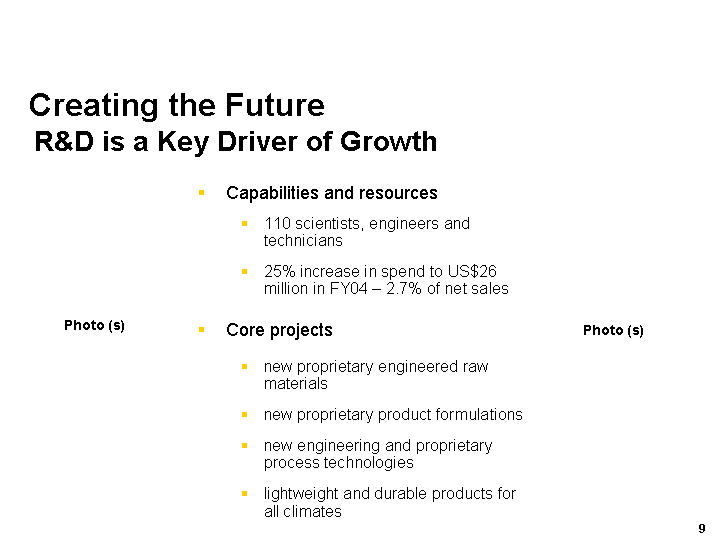
| Capabilities and resources 110 scientists, engineers and technicians 25% increase in spend to US$26 million in FY04 - 2.7% of net sales Core projects new proprietary engineered raw materials new proprietary product formulations new engineering and proprietary process technologies lightweight and durable products for all climates Creating the Future R&D is a Key Driver of Growth Photo (s) Photo (s) |
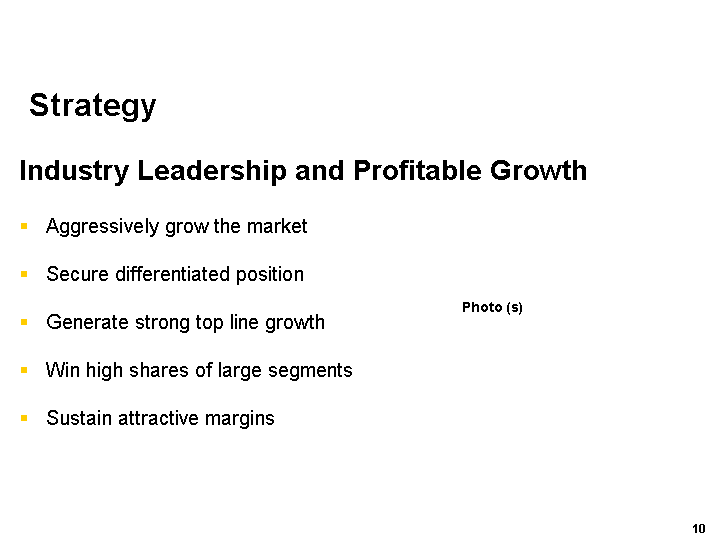
| Strategy Industry Leadership and Profitable Growth Aggressively grow the market Secure differentiated position Generate strong top line growth Win high shares of large segments Sustain attractive margins Photo (s) |
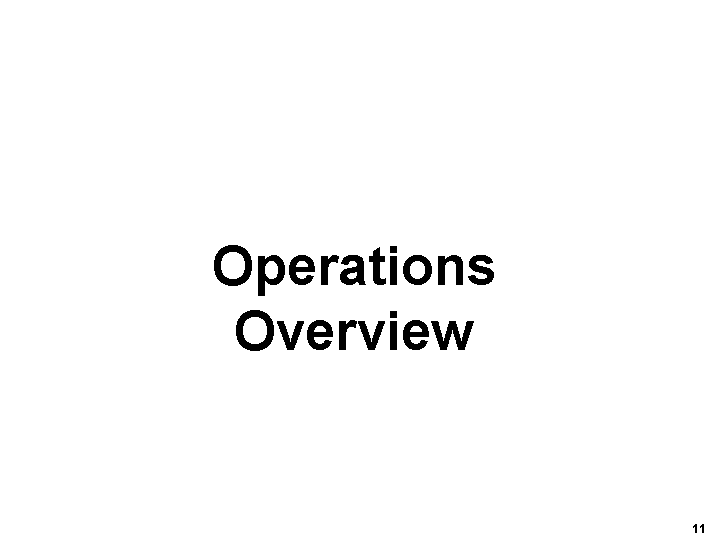
| Operations Overview |
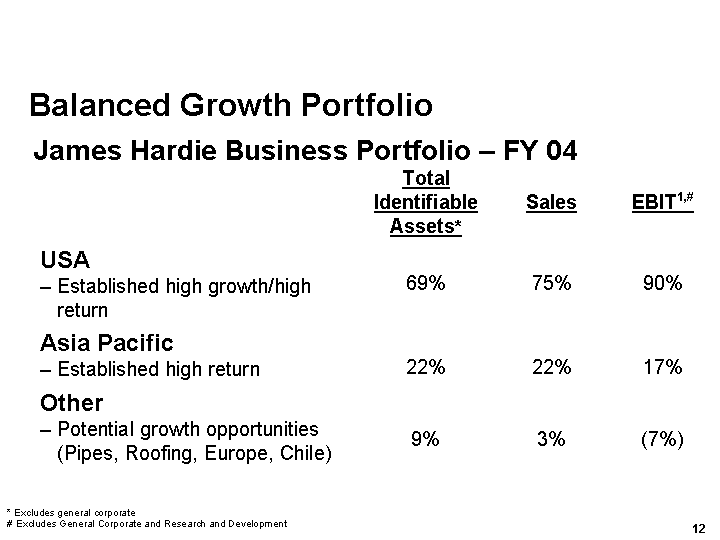
| Balanced Growth Portfolio James Hardie Business Portfolio - FY 04 Total Identifiable Assets* Sales EBIT1,# USA - - Established high growth/high return 69% 75% 90% Asia Pacific - - Established high return 22% 22% 17% Other - - Potential growth opportunities (Pipes, Roofing, Europe, Chile) 9% 3% (7%) * Excludes general corporate # Excludes General Corporate and Research and Development |
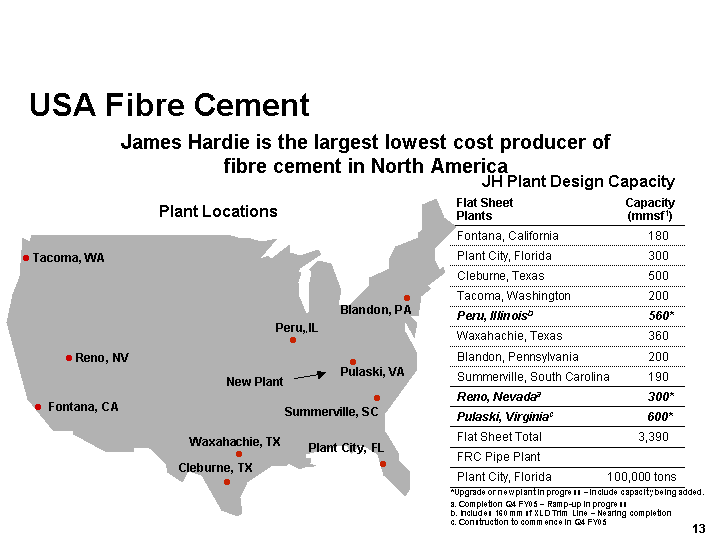
| USA Fibre Cement James Hardie is the largest lowest cost producer of fibre cement in North America Plant Locations Flat Sheet Plants Flat Sheet Plants Capacity (mmsf1) Fontana, California Fontana, California 180 Plant City, Florida Plant City, Florida 300 Cleburne, Texas Cleburne, Texas 500 Tacoma, Washington Tacoma, Washington 200 Peru, Illinoisb Peru, Illinoisb 560* Waxahachie, Texas Waxahachie, Texas 360 Blandon, Pennsylvania Blandon, Pennsylvania 200 Summerville, South Carolina Summerville, South Carolina 190 Reno, Nevadaa Reno, Nevadaa 300* Pulaski, Virginiac Pulaski, Virginiac 600* Flat Sheet Total Flat Sheet Total 3,390 FRC Pipe Plant FRC Pipe Plant Plant City, Florida 100,000 tons 100,000 tons JH Plant Design Capacity *Upgrade or new plant in progress - include capacity being added. a. Completion Q4 FY05 - Ramp-up in progress b. Includes 160 mmsf XLD Trim Line - Nearing completion c. Construction to commence in Q4 FY05 Tacoma, WA Fontana, CA Plant City, FL Waxahachie, TX Cleburne, TX Peru,, IL Blandon, PA Summerville, SC Pulaski, VA Reno, NV New Plant |
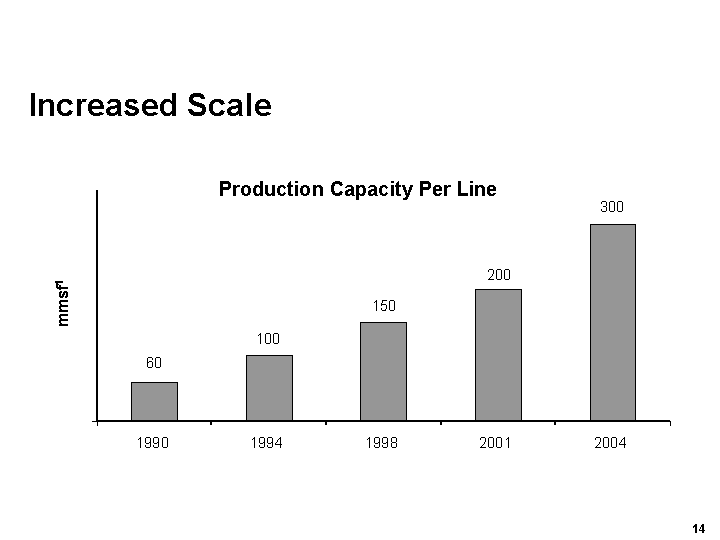
| Increased Scale 1990 1994 1998 2001 2004 mmsf1 60 100 150 200 300 Production Capacity Per Line |
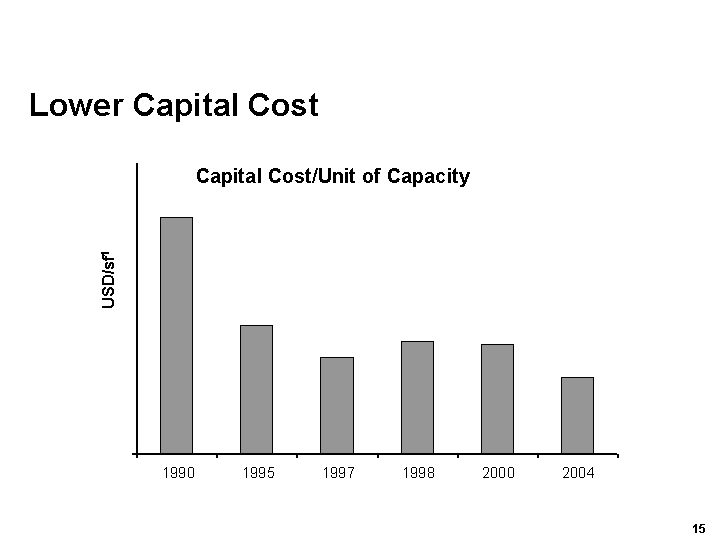
| Lower Capital Cost 1990 1995 1997 1998 2000 2004 USD/sf1 Capital Cost/Unit of Capacity |
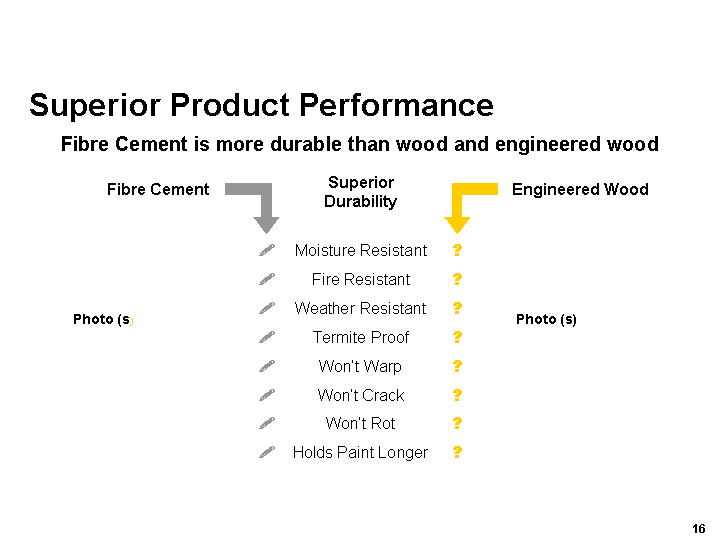
| Superior Product Performance Fibre Cement is more durable than wood and engineered wood Fibre Cement Superior Durability Moisture Resistant Fire Resistant Weather Resistant Termite Proof Won't Warp Won't Crack Won't Rot Holds Paint Longer ? ? ? ? ? ? ? ? ? ? ? ? ? ? ? ? Engineered Wood Photo (s) Photo (s) |
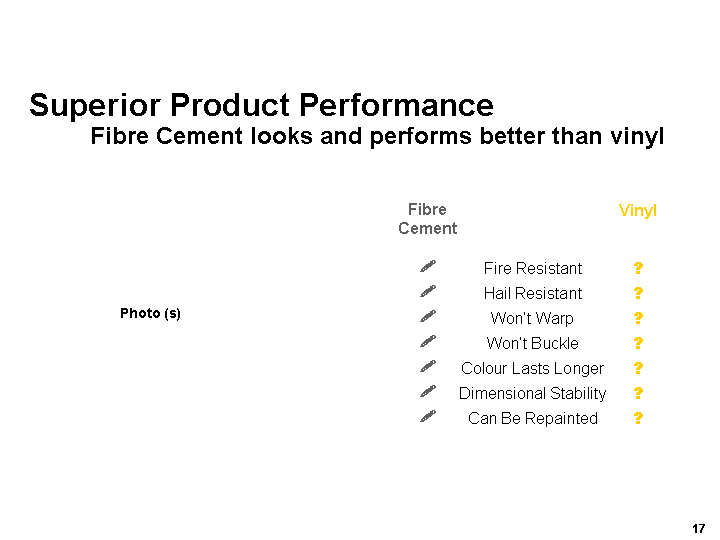
| Superior Product Performance Fibre Cement looks and performs better than vinyl Vinyl Fire Resistant Hail Resistant Won't Warp Won't Buckle Colour Lasts Longer Dimensional Stability Can Be Repainted ? ? ? ? ? ? ? ? ? ? ? ? ? ? Fibre Cement Photo (s) |

| Numerous Revenue Growth Streams Trim Growth 1998 1999 2000 2001 2002 2003 2004 1997 Siding Growth 1998 1999 2000 2001 2002 2003 2004 Soffit Growth 1998 1999 2000 2001 2002 2003 2004 1/4" Hardibacker Volume Growth FY97 FY98 FY99 FY00 FY01 FY02 FY03 FY04 Retail Volume Growth FY00 FY01 FY02 FY03 FY04 1/2" Hardibacker Volume Growth FY97 FY98 FY99 FY00 FY01 FY02 FY03 FY04 |
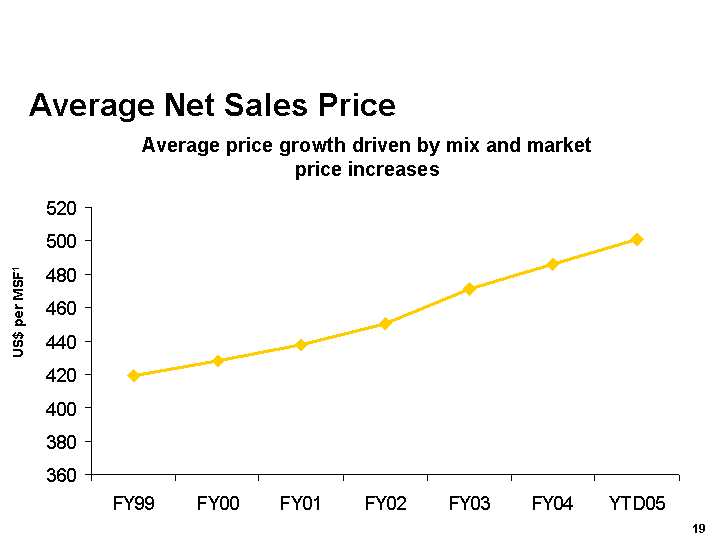
| Average price growth driven by mix and market price increases Average Net Sales Price US$ per MSF1 |
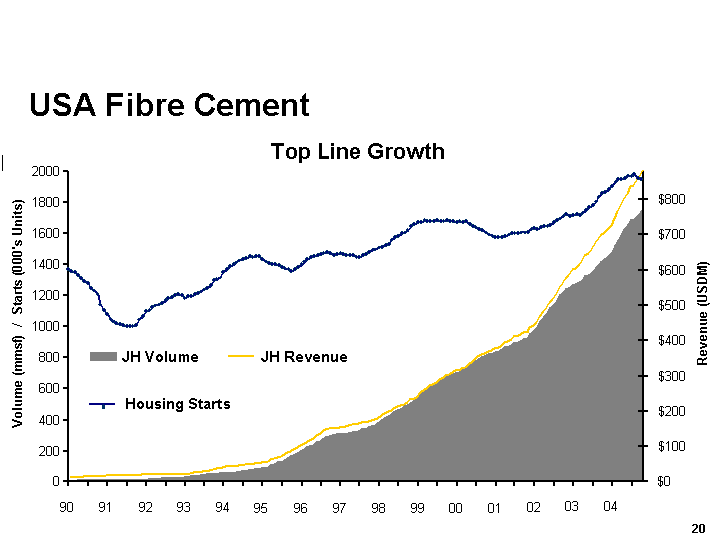
| USA Fibre Cement Top Line Growth 0 200 400 600 800 1000 1200 1400 1600 1800 2000 90 91 92 93 94 95 96 97 98 99 00 01 02 03 04 Volume (mmsf) / Starts (000's Units) $0 $100 $200 $300 $400 $500 $600 $700 $800 Revenue (USDM) JH Volume JH Revenue Housing Starts |
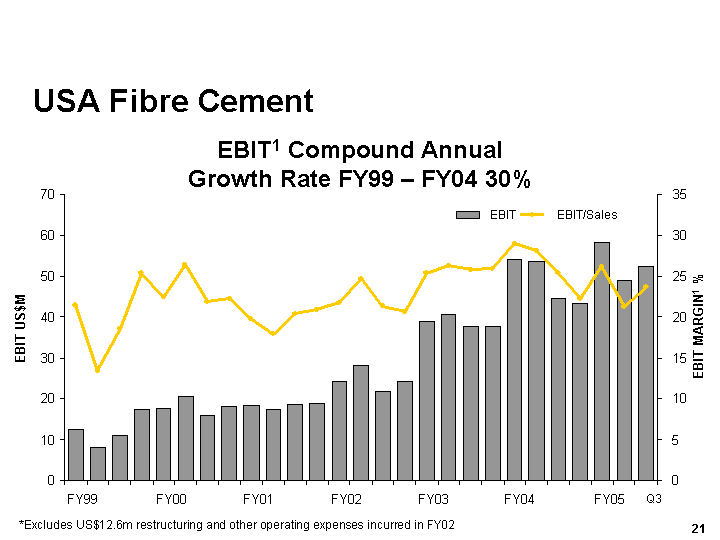
| USA Fibre Cement *Excludes restructuring and other operating expenses 0 10 20 30 40 50 60 70 FY99 FY00 FY01 FY02 FY03 FY04 FY05 EBIT US$M 0 5 10 15 20 25 30 35 EBIT MARGIN1 % EBIT EBIT/Sales Q3 EBIT1 Compound Annual Growth Rate FY99 - FY04 30% *Excludes US$12.6m restructuring and other operating expenses incurred in FY02 |
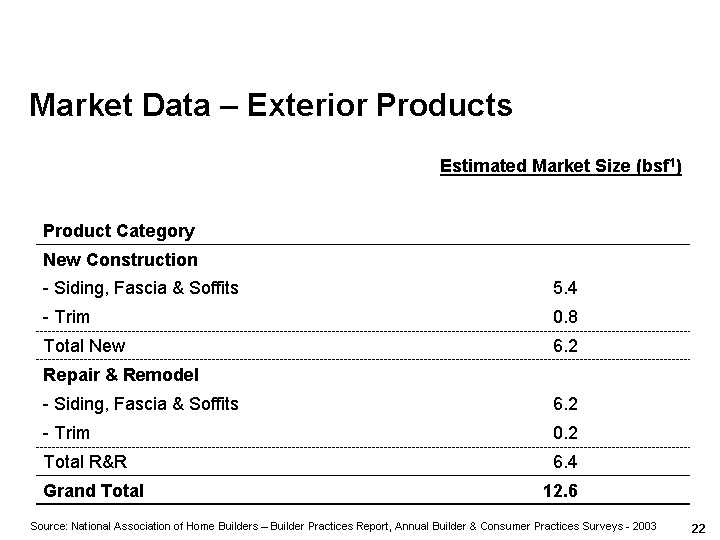
| Market Data - Exterior Products Product Category Estimated Market Size (bsf1) New Construction - Siding, Fascia & Soffits 5.4 - Trim 0.8 Total New 6.2 Repair & Remodel - Siding, Fascia & Soffits 6.2 - Trim 0.2 Total R&R 6.4 Grand Total 12.6 Source: National Association of Home Builders - Builder Practices Report, Annual Builder & Consumer Practices Surveys - 2003 |
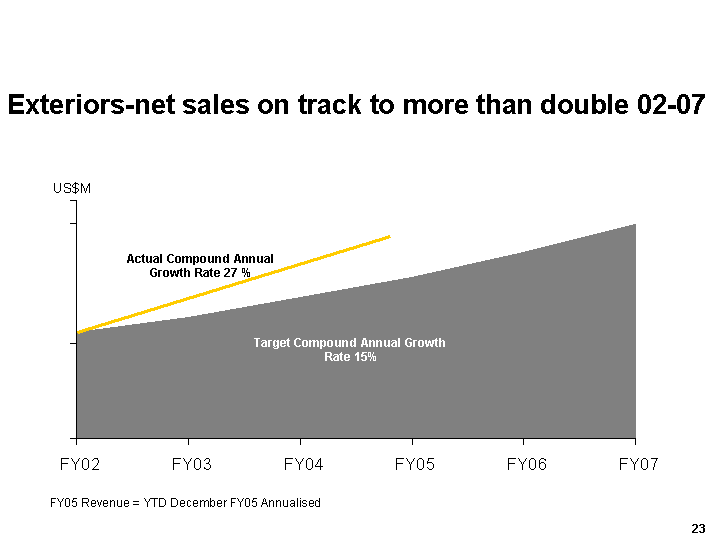
| Exteriors-net sales on track to more than double 02-07 FY05 Revenue = YTD December FY05 Annualised FY02 FY03 FY04 FY05 FY06 FY07 Target Compound Annual Growth Rate 15% Actual Compound Annual Growth Rate 27 % US$M |
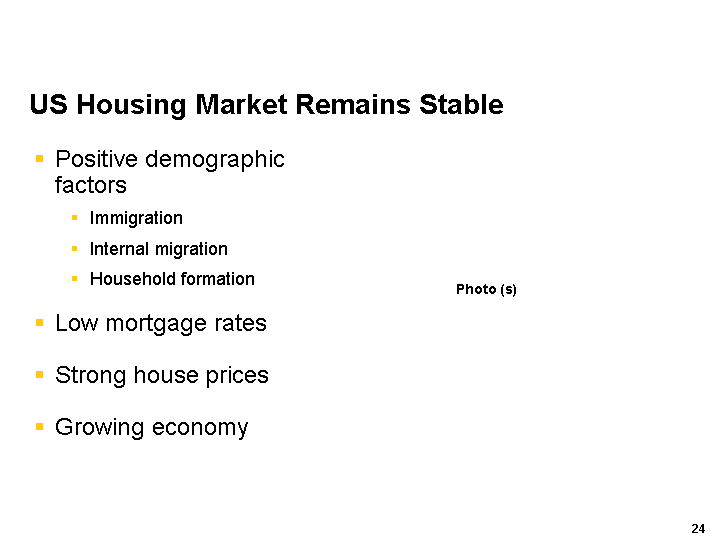
| US Housing Market Remains Stable Positive demographic factors Immigration Internal migration Household formation Low mortgage rates Strong house prices Growing economy Photo (s) |
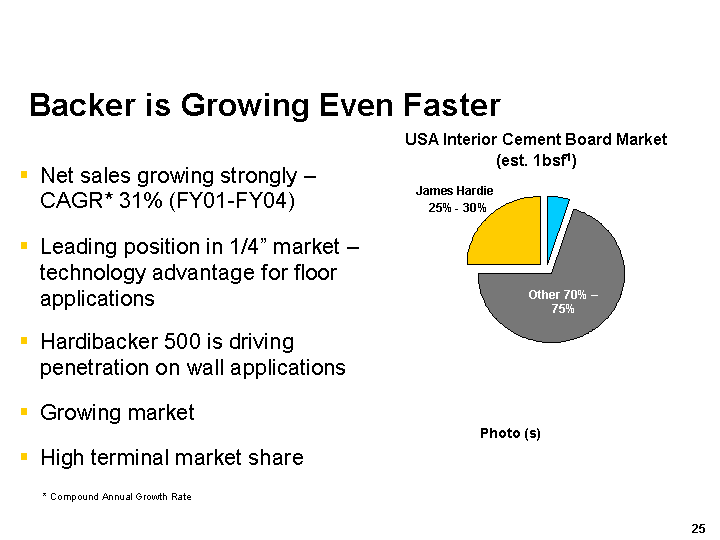
| Backer is Growing Even Faster USA Interior Cement Board Market (est. 1bsf1) James Hardie 25% - 30% Other 70% - 75% Net sales growing strongly - CAGR* 31% (FY01-FY04) Leading position in 1/4" market - technology advantage for floor applications Hardibacker 500 is driving penetration on wall applications Growing market High terminal market share * Compound Annual Growth Rate Photo (s) |
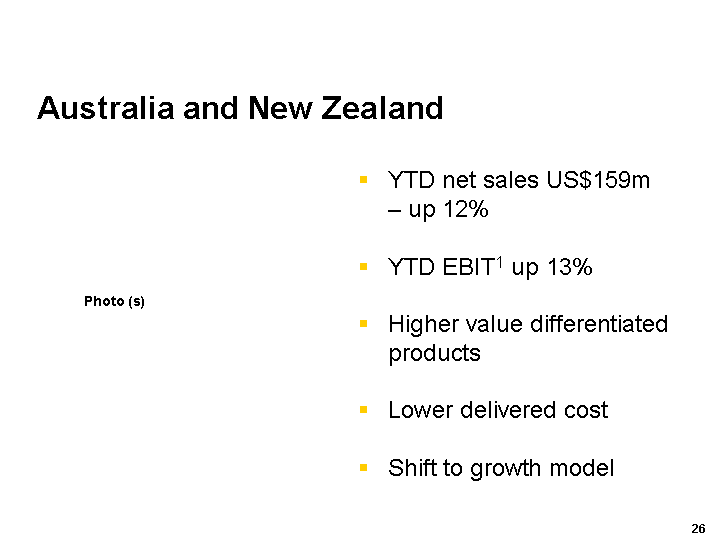
| Australia and New Zealand YTD net sales US$159m - - up 12% YTD EBIT1 up 13% Higher value differentiated products Lower delivered cost Shift to growth model Photo (s) |
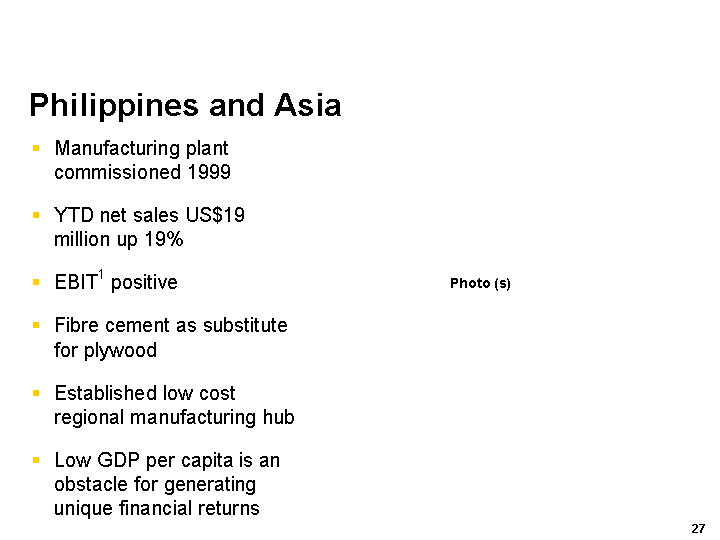
| Philippines and Asia Manufacturing plant commissioned 1999 YTD net sales US$19 million up 19% EBIT1 positive Fibre cement as substitute for plywood Established low cost regional manufacturing hub Low GDP per capita is an obstacle for generating unique financial returns Photo (s) |
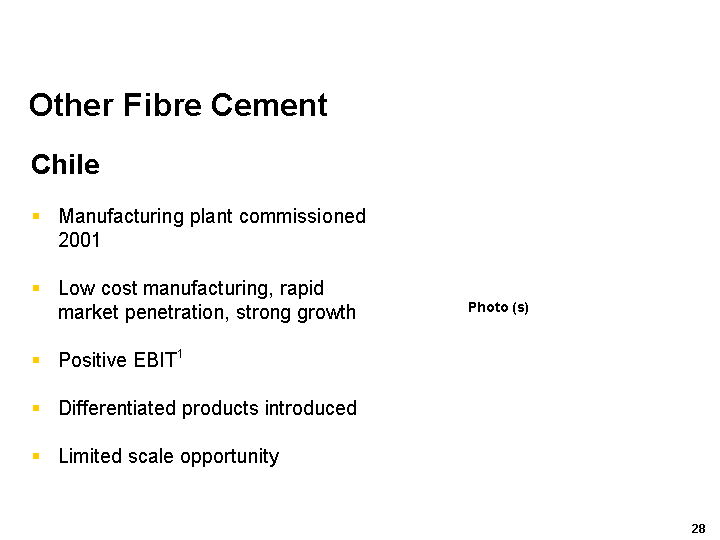
| Other Fibre Cement Chile Manufacturing plant commissioned 2001 Low cost manufacturing, rapid market penetration, strong growth Positive EBIT1 Differentiated products introduced Limited scale opportunity Photo (s) |
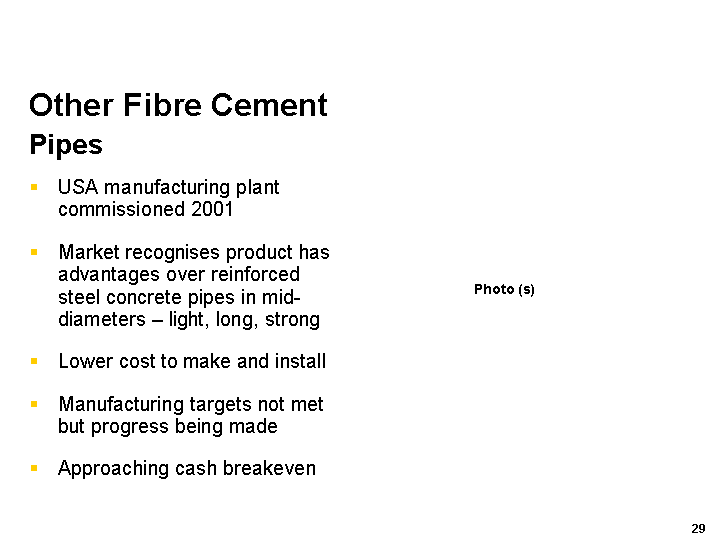
| Pipes USA manufacturing plant commissioned 2001 Market recognises product has advantages over reinforced steel concrete pipes in mid- diameters - light, long, strong Lower cost to make and install Manufacturing targets not met but progress being made Approaching cash breakeven Other Fibre Cement Photo (s) |
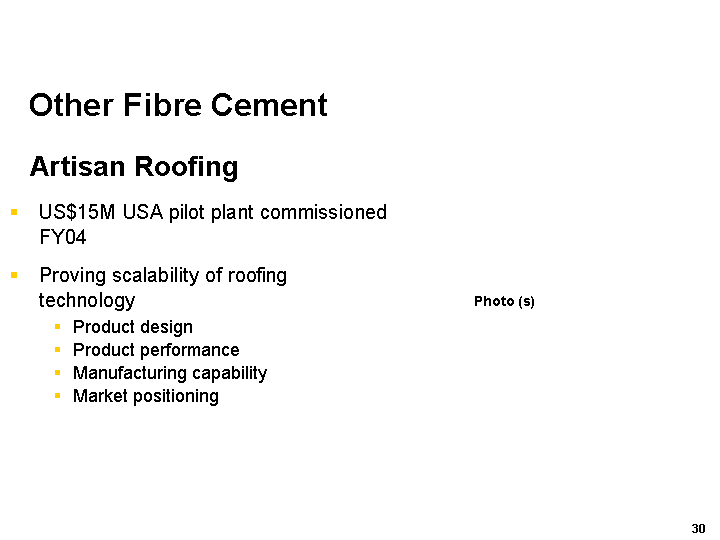
| Other Fibre Cement Artisan Roofing US$15M USA pilot plant commissioned FY04 Proving scalability of roofing technology Product design Product performance Manufacturing capability Market positioning Photo (s) |
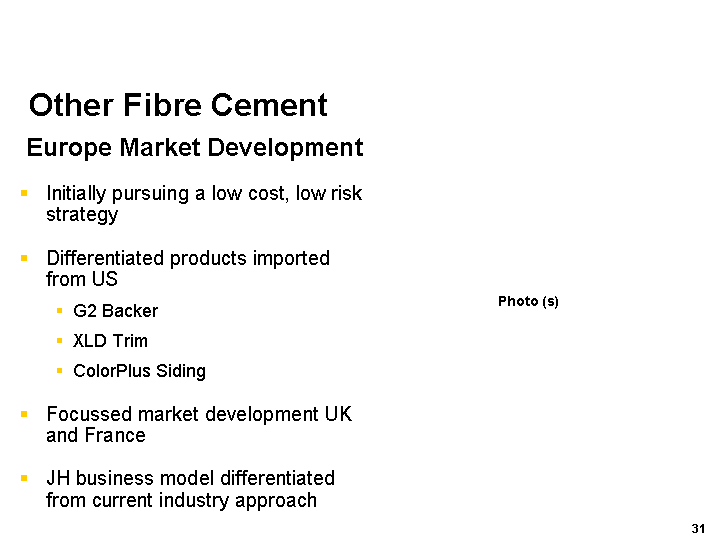
| Other Fibre Cement Europe Market Development Initially pursuing a low cost, low risk strategy Differentiated products imported from US G2 Backer XLD Trim ColorPlus Siding Focussed market development UK and France JH business model differentiated from current industry approach Photo (s) |
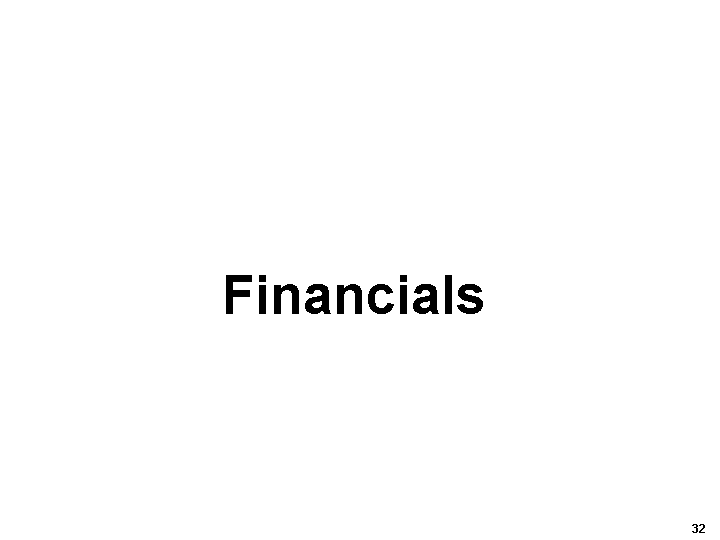
| Financials |
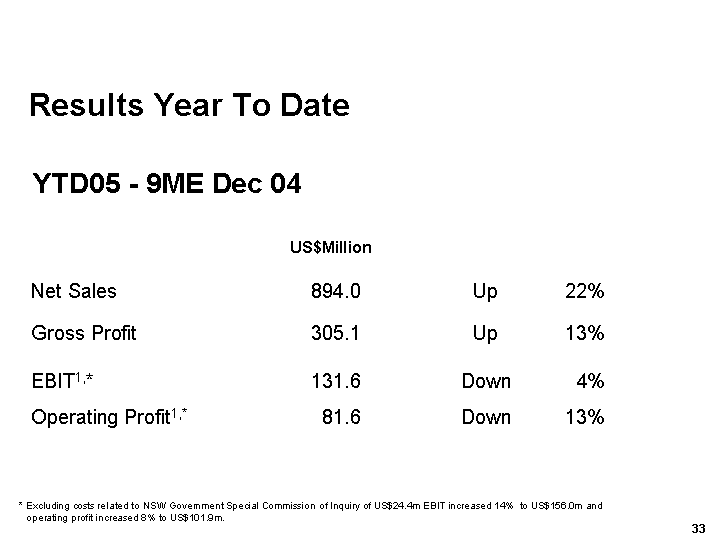
| Results Year To Date US$Million Net Sales 894.0 Up 22% Gross Profit 305.1 Up 13% EBIT1,* 131.6 Down 4% Operating Profit1,* 81.6 Down 13% YTD05 - 9ME Dec 04 * Excluding costs related to NSW Government Special Commission of Inquiry of US$24.4m EBIT increased 14% to US$156.0m and operating profit increased 8% to US$101.9m. |
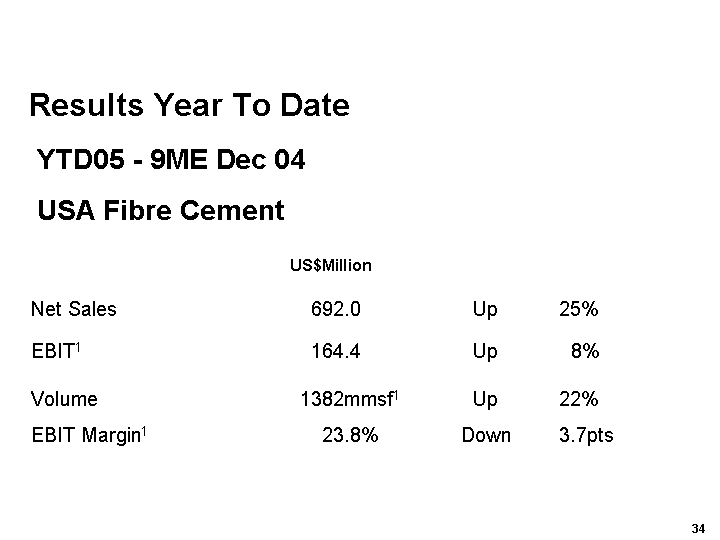
| Results Year To Date US$Million Net Sales 692.0 Up 25% EBIT1 164.4 Up 8% Volume 1382mmsf1 Up 22% EBIT Margin1 23.8% Down 3.7pts YTD05 - 9ME Dec 04 USA Fibre Cement |
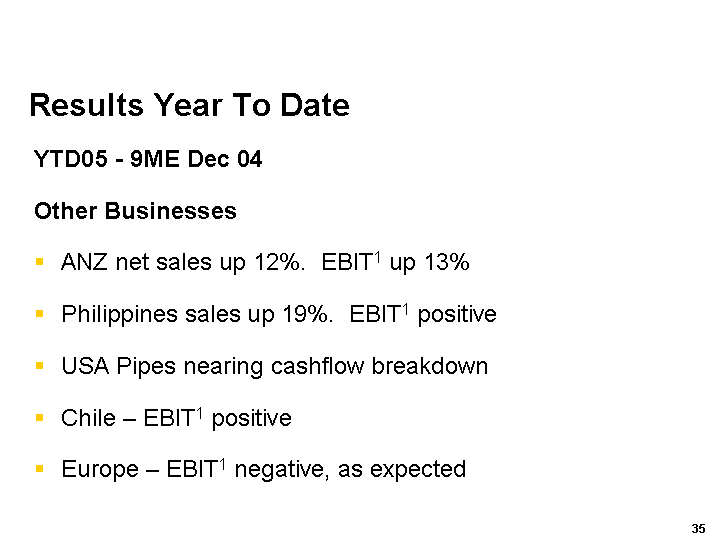
| Results Year To Date YTD05 - 9ME Dec 04 Other Businesses ANZ net sales up 12%. EBIT1 up 13% Philippines sales up 19%. EBIT1 positive USA Pipes nearing cashflow breakdown Chile - EBIT1 positive Europe - EBIT1 negative, as expected |
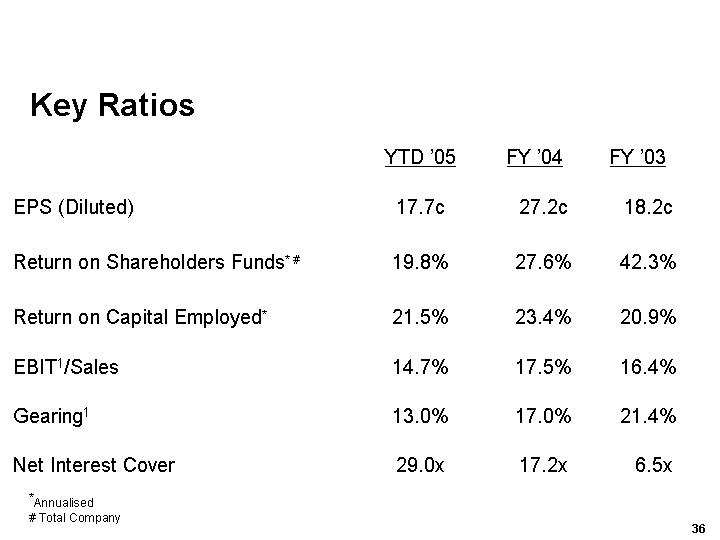
| Key Ratios YTD '05 FY '04 FY '03 EPS (Diluted) 17.7c 27.2c 18.2c Return on Shareholders Funds* # 19.8% 27.6% 42.3% Return on Capital Employed* 21.5% 23.4% 20.9% EBIT1/Sales 14.7% 17.5% 16.4% Gearing1 13.0% 17.0% 21.4% Net Interest Cover 29.0x 17.2x 6.5x *Annualised # Total Company |
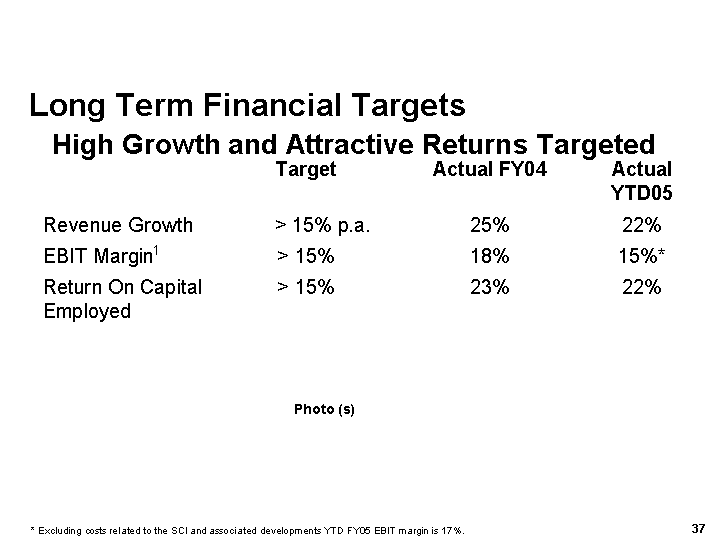
| High Growth and Attractive Returns Targeted Long Term Financial Targets Target Actual FY04 Actual YTD05 Revenue Growth > 15% p.a. 25% 22% EBIT Margin1 > 15% 18% 15%* Return On Capital Employed > 15% 23% 22% * Excluding costs related to the SCI and associated developments YTD FY05 EBIT margin is 17%. Photo (s) |
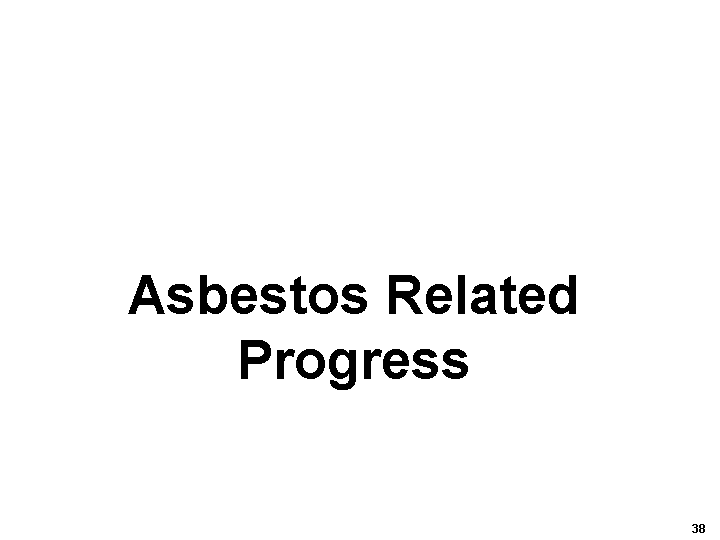
| Asbestos Related Progress |
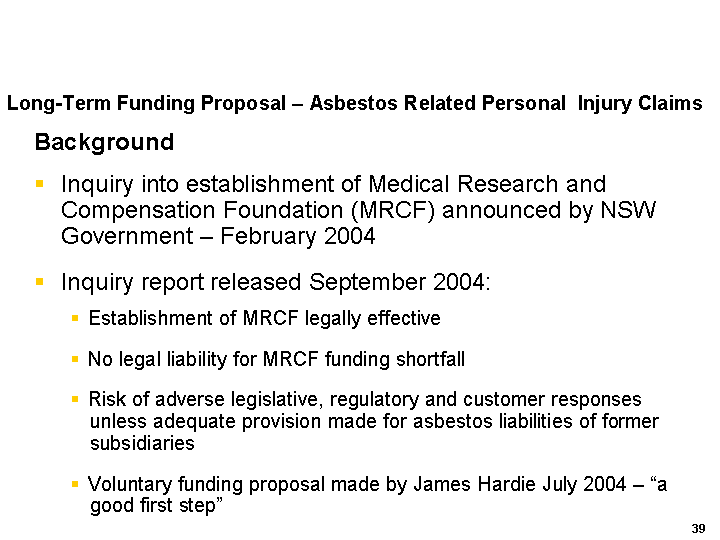
| Long-Term Funding Proposal - Asbestos Related Personal Injury Claims Background Inquiry into establishment of Medical Research and Compensation Foundation (MRCF) announced by NSW Government - February 2004 Inquiry report released September 2004: Establishment of MRCF legally effective No legal liability for MRCF funding shortfall Risk of adverse legislative, regulatory and customer responses unless adequate provision made for asbestos liabilities of former subsidiaries Voluntary funding proposal made by James Hardie July 2004 - "a good first step" |
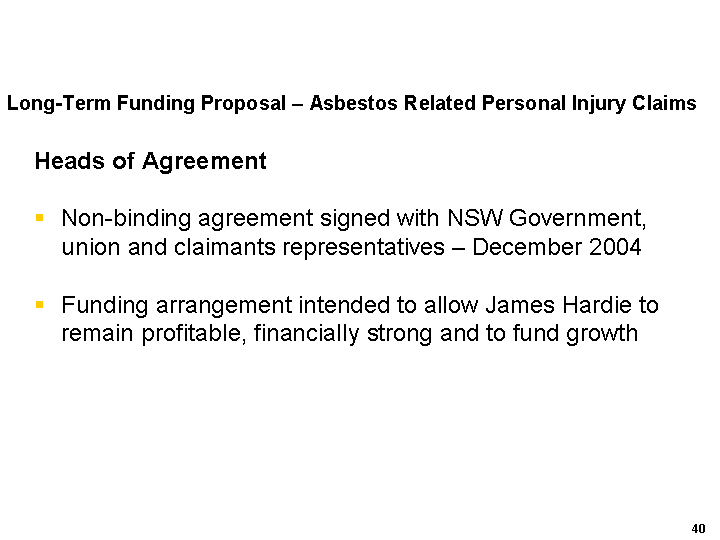
| Long-Term Funding Proposal - Asbestos Related Personal Injury Claims Heads of Agreement Non-binding agreement signed with NSW Government, union and claimants representatives - December 2004 Funding arrangement intended to allow James Hardie to remain profitable, financially strong and to fund growth |

| Long-Term Funding Proposal - Asbestos Related Personal Injury Claims Key Elements Special Purpose Fund (SPF) to be established - James Hardie to appoint majority of Board Initial funding based on KPMG Actuaries updated report- discounted central estimate A$1.5bn at 30 June 2004 Annual contribution to SPF based on annual actuarial assessments A rolling 2 year cash buffer to be established in SPF Cap on annual contributions after 1st year based on a percentage of net operating cashflow - initial cap 35%, with phased reduction to 10% possible over time |
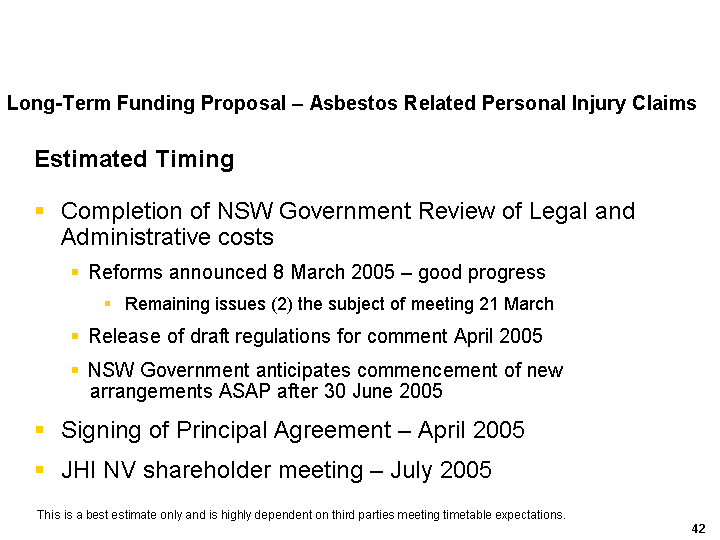
| Long-Term Funding Proposal - Asbestos Related Personal Injury Claims Estimated Timing Completion of NSW Government Review of Legal and Administrative costs Reforms announced 8 March 2005 - good progress Remaining issues (2) the subject of meeting 21 March Release of draft regulations for comment April 2005 NSW Government anticipates commencement of new arrangements ASAP after 30 June 2005 Signing of Principal Agreement - April 2005 JHI NV shareholder meeting - July 2005 This is a best estimate only and is highly dependent on third parties meeting timetable expectations. |
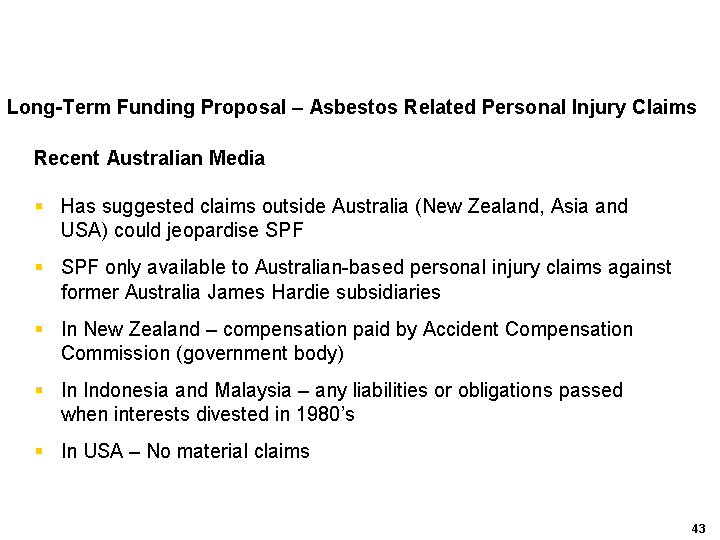
| Long-Term Funding Proposal - Asbestos Related Personal Injury Claims Recent Australian Media Has suggested claims outside Australia (New Zealand, Asia and USA) could jeopardise SPF SPF only available to Australian-based personal injury claims against former Australia James Hardie subsidiaries In New Zealand - compensation paid by Accident Compensation Commission (government body) In Indonesia and Malaysia - any liabilities or obligations passed when interests divested in 1980's In USA - No material claims |
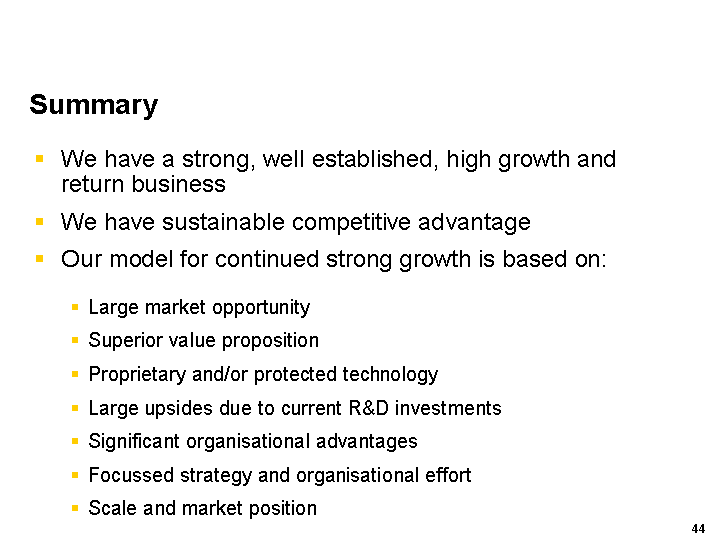
| Summary We have a strong, well established, high growth and return business We have sustainable competitive advantage Our model for continued strong growth is based on: Large market opportunity Superior value proposition Proprietary and/or protected technology Large upsides due to current R&D investments Significant organisational advantages Focussed strategy and organisational effort Scale and market position |
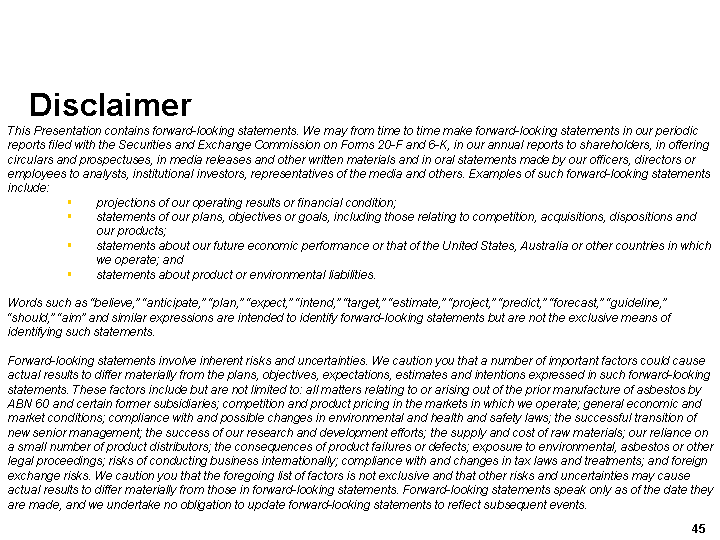
| Disclaimer This Presentation contains forward-looking statements. We may from time to time make forward-looking statements in our periodic reports filed with the Securities and Exchange Commission on Forms 20-F and 6-K, in our annual reports to shareholders, in offering circulars and prospectuses, in media releases and other written materials and in oral statements made by our officers, directors or employees to analysts, institutional investors, representatives of the media and others. Examples of such forward-looking statements include: projections of our operating results or financial condition; statements of our plans, objectives or goals, including those relating to competition, acquisitions, dispositions and our products; statements about our future economic performance or that of the United States, Australia or other countries in which we operate; and statements about product or environmental liabilities. Words such as "believe," "anticipate," "plan," "expect," "intend," "target," "estimate," "project," "predict," "forecast," "guideline," "should," "aim" and similar expressions are intended to identify forward-looking statements but are not the exclusive means of identifying such statements. Forward-looking statements involve inherent risks and uncertainties. We caution you that a number of important factors could cause actual results to differ materially from the plans, objectives, expectations, estimates and intentions expressed in such forward-looking statements. These factors include but are not limited to: all matters relating to or arising out of the prior manufacture of asbestos by ABN 60 and certain former subsidiaries; competition and product pricing in the markets in which we operate; general economic and market conditions; compliance with and possible changes in environmental and health and safety laws; the successful transition of new senior management; the success of our research and development efforts; the supply and cost of raw materials; our reliance on a small number of product distributors; the consequences of product failures or defects; exposure to environmental, asbestos or other legal proceedings; risks of conducting business internationally; compliance with and changes in tax laws and treatments; and foreign exchange risks. We caution you that the foregoing list of factors is not exclusive and that other risks and uncertainties may cause actual results to differ materially from those in forward-looking statements. Forward-looking statements speak only as of the date they are made, and we undertake no obligation to update forward-looking statements to reflect subsequent events. |
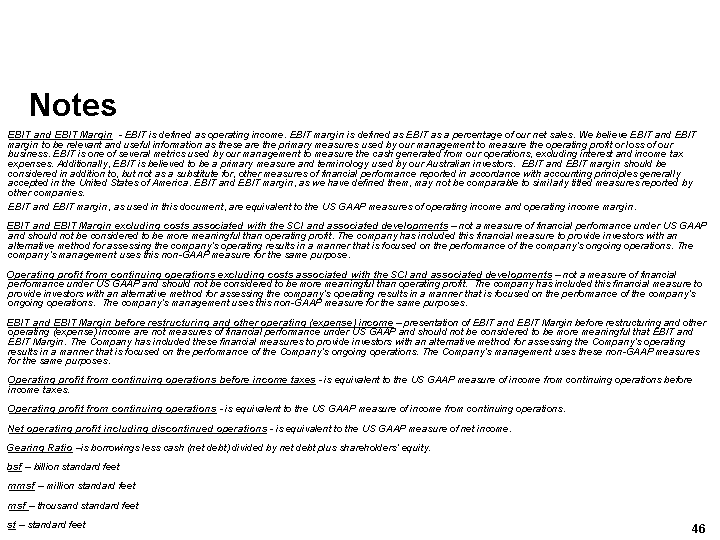
| Notes EBIT and EBIT Margin - EBIT is defined as operating income. EBIT margin is defined as EBIT as a percentage of our net sales. We believe EBIT and EBIT margin to be relevant and useful information as these are the primary measures used by our management to measure the operating profit or loss of our business. EBIT is one of several metrics used by our management to measure the cash generated from our operations, excluding interest and income tax expenses. Additionally, EBIT is believed to be a primary measure and terminology used by our Australian investors. EBIT and EBIT margin should be considered in addition to, but not as a substitute for, other measures of financial performance reported in accordance with accounting principles generally accepted in the United States of America. EBIT and EBIT margin, as we have defined them, may not be comparable to similarly titled measures reported by other companies. EBIT and EBIT margin, as used in this document, are equivalent to the US GAAP measures of operating income and operating income margin. EBIT and EBIT Margin excluding costs associated with the SCI and associated developments - not a measure of financial performance under US GAAP and should not be considered to be more meaningful than operating profit. The company has included this financial measure to provide investors with an alternative method for assessing the company's operating results in a manner that is focused on the performance of the company's ongoing operations. The company's management uses this non-GAAP measure for the same purpose. Operating profit from continuing operations excluding costs associated with the SCI and associated developments - not a measure of financial performance under US GAAP and should not be considered to be more meaningful than operating profit. The company has included this financial measure to provide investors with an alternative method for assessing the company's operating results in a manner that is focused on the performance of the company's ongoing operations. The company's management uses this non-GAAP measure for the same purposes. EBIT and EBIT Margin before restructuring and other operating (expense) income - presentation of EBIT and EBIT Margin before restructuring and other operating (expense) income are not measures of financial performance under US GAAP and should not be considered to be more meaningful that EBIT and EBIT Margin. The Company has included these financial measures to provide investors with an alternative method for assessing the Company's operating results in a manner that is focused on the performance of the Company's ongoing operations. The Company's management uses these non-GAAP measures for the same purposes. Operating profit from continuing operations before income taxes - is equivalent to the US GAAP measure of income from continuing operations before income taxes. Operating profit from continuing operations - is equivalent to the US GAAP measure of income from continuing operations. Net operating profit including discontinued operations - is equivalent to the US GAAP measure of net income. Gearing Ratio -is borrowings less cash (net debt) divided by net debt plus shareholders' equity. bsf - billion standard feet mmsf - million standard feet msf - thousand standard feet st - standard feet |
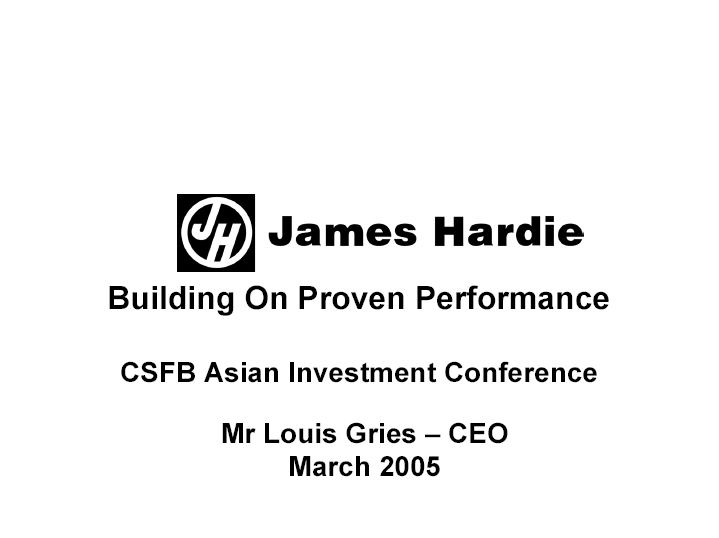
| Building On Proven Performance CSFB Asian Investment Conference Mr Louis Gries - CEO March 2005 |